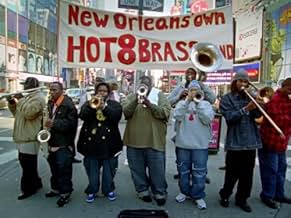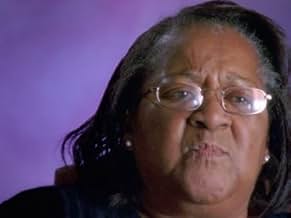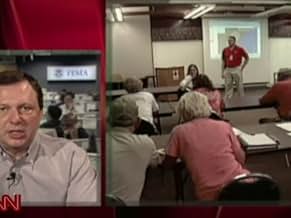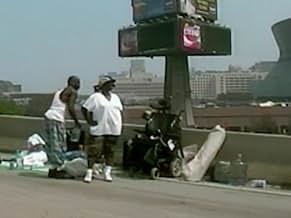व्हेन द लेवीज़ ब्रोक: ए रिक्वेम इन फोर एक्ट्स
मूल शीर्षक: When the Levees Broke: A Requiem in Four Acts
IMDb रेटिंग
8.5/10
5 हज़ार
आपकी रेटिंग
अपनी भाषा में प्लॉट जोड़ेंAn examination of the U.S. government's response to Hurricane Katrina.An examination of the U.S. government's response to Hurricane Katrina.An examination of the U.S. government's response to Hurricane Katrina.
- 3 प्राइमटाइम एमी जीते
- 8 जीत और कुल 9 नामांकन
एपिसोड ब्राउज़ करें
फ़ीचर्ड समीक्षाएं
10juleyda
I saw this four-hour documentary here in the city, in an arena with about 8000 other locals (I was born and raised here and this is my first visit since Katrina). It was beautiful and had me crying from the opening montage, with the incredibly beautiful New Orleans music and Blanchard's haunting score. The point of the movie seemed to me to document the horrors and outrages that the human beings in the NOLA area had to survive (as Lee said introducing the movie, be sure you have a box of Kleenex), as well as their inimitable humor and love of life that has so far been the ONLY thing to sustain the city. In the nightmare aftermath of insurance ripoffs, government incompetence and stinginess, and frequent scorn and betrayal by other "Americans," we New Orleanians now know that we have NOBODY to rely on but ourselves and each other. And after watching this movie, I am beginning to have faith that that might actually be enough. Because we are strong, resourceful, loving, fun, proud, badass people. And to his enormous credit, Spike Lee totally gets us and has really captured the soul of the city itself: its priceless daughters and sons. All of us.
Our local rag, the Times-Picayune, published a racist and misleading review of the movie on the day it was going to be screened, basically saying it only portrayed the black experience of Katrina, whatever that means. Many white people I know didn't want to see it, based on this, which is a horrible mistake. Some of Lee's movies are provocative representations of race relations; this one IS NOT, or at least, not in that sense. Please don't fall for that--the documentary shows many different views, and of course not all "black" views are the same either, as we see, for example, in the astute critique of Condi Rice's shoe shopping jaunt. Racism is certainly an issue in discussing Katrina, but this movie doesn't endorse divisiveness at all.
I think we in the US, or at least in NOLA, ought to know better than to think that we can only relate to people who look like us. I wept for and laughed and cheered almost all the interviewees in the movie, whatever their skin color. The white women in St. Bernard and the black folks from the Lower Nine, the white guy from Uptown and the creoles from around the city. Even the rich couple from Park Island, who reminded my husband of Lovey and Thuston Howell. We are all affected by the events of Katrina, not in the same ways, but that's why this movie can help us. We can see many different Katrina stories and get a bit more sense of the scope and scale of this disaster. I grew up in Gentilly Woods so I identified most with the family in Pontchartrain Park, a few blocks north, even though I'm white and they're black. Go figure.
The bigger point is, white people need to stop freaking out about race and whether NOLA is a "chocolate city" or not, and look at the real problems: the wetlands, the federal, state, and local neglect of the levees, and the problems that preceded: education, economy, infrastructure. Those affect everyone in the city, and people outside NOLA should take heed, these are not just our problems either. This could happen to you.
Our local rag, the Times-Picayune, published a racist and misleading review of the movie on the day it was going to be screened, basically saying it only portrayed the black experience of Katrina, whatever that means. Many white people I know didn't want to see it, based on this, which is a horrible mistake. Some of Lee's movies are provocative representations of race relations; this one IS NOT, or at least, not in that sense. Please don't fall for that--the documentary shows many different views, and of course not all "black" views are the same either, as we see, for example, in the astute critique of Condi Rice's shoe shopping jaunt. Racism is certainly an issue in discussing Katrina, but this movie doesn't endorse divisiveness at all.
I think we in the US, or at least in NOLA, ought to know better than to think that we can only relate to people who look like us. I wept for and laughed and cheered almost all the interviewees in the movie, whatever their skin color. The white women in St. Bernard and the black folks from the Lower Nine, the white guy from Uptown and the creoles from around the city. Even the rich couple from Park Island, who reminded my husband of Lovey and Thuston Howell. We are all affected by the events of Katrina, not in the same ways, but that's why this movie can help us. We can see many different Katrina stories and get a bit more sense of the scope and scale of this disaster. I grew up in Gentilly Woods so I identified most with the family in Pontchartrain Park, a few blocks north, even though I'm white and they're black. Go figure.
The bigger point is, white people need to stop freaking out about race and whether NOLA is a "chocolate city" or not, and look at the real problems: the wetlands, the federal, state, and local neglect of the levees, and the problems that preceded: education, economy, infrastructure. Those affect everyone in the city, and people outside NOLA should take heed, these are not just our problems either. This could happen to you.
Spike Lee is certainly not correct about levees being blown,but the truth is even worse.He is certainly nearer to the truth than people who blame "the force of the hurricane".As one who rode out both Katrina and Hurricane Betsy in the same house in Gentilly,it was obvious at the time that Katrina was no worse.The lake levees,which were properly built,though exposed to the full force of the storm,came through unscathed.What collapsed and flooded the main part of the city west of the Industrial Canal were those worthless,cracker box,stage-prop "flood walls" along the drainage canals that folded up and collapsed like cheap card tables the minute the water rose.
Besides the Corps of Engineers,we can blame former Mayor "Slimy Sidney" Barthelemy"The Man Who Murdered A City".He deliberately forced out the veteran engineers of the Sewage & Water Board,so that no one would object to those worthless (but profitable) frauds.AND he had the valuable assistance of the alleged "newspaper",the Times Picayune which covered up his criminality. The incompetent stooges that Barthelemy replaced the experienced engineers with not only approved those worthless flood walls that the old engineers knew were disasters waiting to happen,but, still infesting the Sewage & Water Board to this day,insanely dredged the drainage canals in such a way as to remove what little foundations those flood walls had.The 17th St. Canal shows this graphically.This sits astride the parish line.Jefferson Parish engineers refused to allow this lunatic dredging on THEIR side of the canal, which is why only the Orleans side collapsed.A year before Katrina, people living along the drainage canals complained of salt water seeping into their yards, killing plants.To a COMPETENT,HONEST engineer this a clear sign that something was dangerously wrong with the levee foundations.But the Barthelemy "engineers" swept it under the rug,telling people that they were "imagining things".
And as for blaming those who wouldn't evacuate,If one thing was proved, it is that evacuating a city this size IS NOT PRACTICAL.New Orleans could and should have been an impregnable fortress against hurricanes.The vast bulk of the misery caused by Barthelemy's Flood was the destruction of the homes,and LIVES of the "survivors",who now have to live,or rather EXIST in this horror.The empty city was picked clean by looters despite the presence of thousands of police and National Guard,which shows that it is the PEOPLE who are the real crime deterrents.Telling people,"Get out, let the hurricane and the looters destroy your homes and businesses,and we will give you sardine can trailers to live in" is typical of the garbage we hear from the government.
Besides the Corps of Engineers,we can blame former Mayor "Slimy Sidney" Barthelemy"The Man Who Murdered A City".He deliberately forced out the veteran engineers of the Sewage & Water Board,so that no one would object to those worthless (but profitable) frauds.AND he had the valuable assistance of the alleged "newspaper",the Times Picayune which covered up his criminality. The incompetent stooges that Barthelemy replaced the experienced engineers with not only approved those worthless flood walls that the old engineers knew were disasters waiting to happen,but, still infesting the Sewage & Water Board to this day,insanely dredged the drainage canals in such a way as to remove what little foundations those flood walls had.The 17th St. Canal shows this graphically.This sits astride the parish line.Jefferson Parish engineers refused to allow this lunatic dredging on THEIR side of the canal, which is why only the Orleans side collapsed.A year before Katrina, people living along the drainage canals complained of salt water seeping into their yards, killing plants.To a COMPETENT,HONEST engineer this a clear sign that something was dangerously wrong with the levee foundations.But the Barthelemy "engineers" swept it under the rug,telling people that they were "imagining things".
And as for blaming those who wouldn't evacuate,If one thing was proved, it is that evacuating a city this size IS NOT PRACTICAL.New Orleans could and should have been an impregnable fortress against hurricanes.The vast bulk of the misery caused by Barthelemy's Flood was the destruction of the homes,and LIVES of the "survivors",who now have to live,or rather EXIST in this horror.The empty city was picked clean by looters despite the presence of thousands of police and National Guard,which shows that it is the PEOPLE who are the real crime deterrents.Telling people,"Get out, let the hurricane and the looters destroy your homes and businesses,and we will give you sardine can trailers to live in" is typical of the garbage we hear from the government.
A requiem is a service intended to express the emotions and beliefs of the survivors at the death of a loved one. A requiem is not an autopsy to determine the cause of death, and if Spike Lee intended a requiem, I think he has succeeded. Criticism that this film is not analytical and precise is actually a complaint that this was not an autopsy--but none was intended.
One day a documentary may be made which closely follows the chronology of the storm and the failure of the levees. A documentary may more closely focus on the devastation of the Mississippi Gulf Coast, and the equally shameful failure of government to deal with the problem there. A documentary may be made which focuses on how daily life has changed for those of us who survived. I don't think Spike Lee intended to cover all of those points. The points he did address were very well presented.
The film is outstanding at communicating the grief, suffering and frustrations of the persons shown in the film. It is a very moving expression of emotion and belief, which is the purpose of a requiem.
I don't think the lack of government response is simply and solely attributable to racism, but that may be because I am white. In the film, that opinion was frequently expressed, but I also note that there were also some opinions expressed about the levees being intentionally dynamited. I think Spike Lee undercut the impact of his major premise by including a rumor that seems similar to the myths of Bigfoot or Elvis being alive.
I think the gross government ineptitude, inertia and political games are all well-documented, and the bottom line is that those persons who were financially able to take care of themselves fared better than those who were not--it's a matter of class and wealth, and not so much a matter of race.
In yesterday's news, it was noted that Congress earlier appropriated $17 billion to build new houses in the affected areas, and that as of this date (August 22, 2006), not a single house has been built with that money in either Louisiana or Mississippi.
One day a documentary may be made which closely follows the chronology of the storm and the failure of the levees. A documentary may more closely focus on the devastation of the Mississippi Gulf Coast, and the equally shameful failure of government to deal with the problem there. A documentary may be made which focuses on how daily life has changed for those of us who survived. I don't think Spike Lee intended to cover all of those points. The points he did address were very well presented.
The film is outstanding at communicating the grief, suffering and frustrations of the persons shown in the film. It is a very moving expression of emotion and belief, which is the purpose of a requiem.
I don't think the lack of government response is simply and solely attributable to racism, but that may be because I am white. In the film, that opinion was frequently expressed, but I also note that there were also some opinions expressed about the levees being intentionally dynamited. I think Spike Lee undercut the impact of his major premise by including a rumor that seems similar to the myths of Bigfoot or Elvis being alive.
I think the gross government ineptitude, inertia and political games are all well-documented, and the bottom line is that those persons who were financially able to take care of themselves fared better than those who were not--it's a matter of class and wealth, and not so much a matter of race.
In yesterday's news, it was noted that Congress earlier appropriated $17 billion to build new houses in the affected areas, and that as of this date (August 22, 2006), not a single house has been built with that money in either Louisiana or Mississippi.
Spike Lee has made his most powerful work yet with "When The Levees Broke". It has only been one night and two hours, but this documentary has moved me in such a way. I lived to see this on television but nothing quite put me in the middle of this disaster than this documentary. In depth interviews with the mayor, governor and citizens of New Orleans and the Ninth Ward was so stripped down and raw, I couldn't do anything but weep. This is really the first motion picture or anything of that like to make me cry. I felt like I was there and experienced it. One thing that I applaud Spike for was keeping it real. Nothing was censored, which comes to no surprise because it's on HBO, but vivid portrayals of the environment such as dead bodies or backed up sewage, were shown and even when it wasn't you felt like you could see or smell it. The frustration of the people of New Orleans pierces your heart and you could do nothing but feel for them. In two hours, "When The Leeves Broke" taught me things and gave a lot of insight on the Hurricane Katrina fiasco. I eagerly await the final two hours.
After seeing this movie, I feel completely betrayed by the United States government and the government of Louisiana. I am from a town right outside of New Orleans (on the Northshore of Lake Pontchatrain) and my town endured much devastation and many people lost their lives. I think that this movie is a great opportunity for Spike Lee to show everyone in the United States that Hurricane Katrina still haunts the lives that it affected 1 year ago, including myself. Many people do not understand the magnitude of this storm and until you smell it, see it in person, and live it YOU WILL NEVER UNDERSTAND. To see the vice president fishing, and Rice shopping in New York just days after the devastation is very unwelcoming but sometimes I believe that at one point, there was nothing that could be done because this country was not ready for a hurricane like this and they never did expect it. But indeed, this movie can give a person a slim sense of what we endured. THe graphics were horrible and very graphic but they were a good touch as to visual understanding of the situation. Many rumors are still circulating about this storm but in my opinion, they will never really get to the end of it. The storm is over and there is no turning back time so pointing fingers is a waste of time. I believe the government needs to focus on the future and the rebuilding process of New Orleans and the other areas who were severely devastated. I give this movie 2 thumbs up because having witnessed the devastation first hand I believe Spike Lee did an extraordinary job to create a documentary that covers all aspects of this storm.
क्या आपको पता है
- ट्रिवियाThe score for When the Levees Broke was re-used in the 2018 Spike Lee Joint BlackKklansman.
- कनेक्शनFeatured in 50 Documentaries to See Before You Die: Episode 1 (2011)
टॉप पसंद
रेटिंग देने के लिए साइन-इन करें और वैयक्तिकृत सुझावों के लिए वॉचलिस्ट करें
- How many seasons does When the Levees Broke: A Requiem in Four Acts have?Alexa द्वारा संचालित
विवरण
- रिलीज़ की तारीख़
- कंट्री ऑफ़ ओरिजिन
- आधिकारिक साइट
- भाषा
- इस रूप में भी जाना जाता है
- When the Levees Broke: A Requiem in Four Acts
- फ़िल्माने की जगहें
- उत्पादन कंपनियां
- IMDbPro पर और कंपनी क्रेडिट देखें
- चलने की अवधि51 मिनट
- रंग
- ध्वनि मिश्रण
- पक्ष अनुपात
- 1.78 : 1
इस पेज में योगदान दें
किसी बदलाव का सुझाव दें या अनुपलब्ध कॉन्टेंट जोड़ें

टॉप गैप
What is the Spanish language plot outline for व्हेन द लेवीज़ ब्रोक: ए रिक्वेम इन फोर एक्ट्स (2006)?
जवाब






















